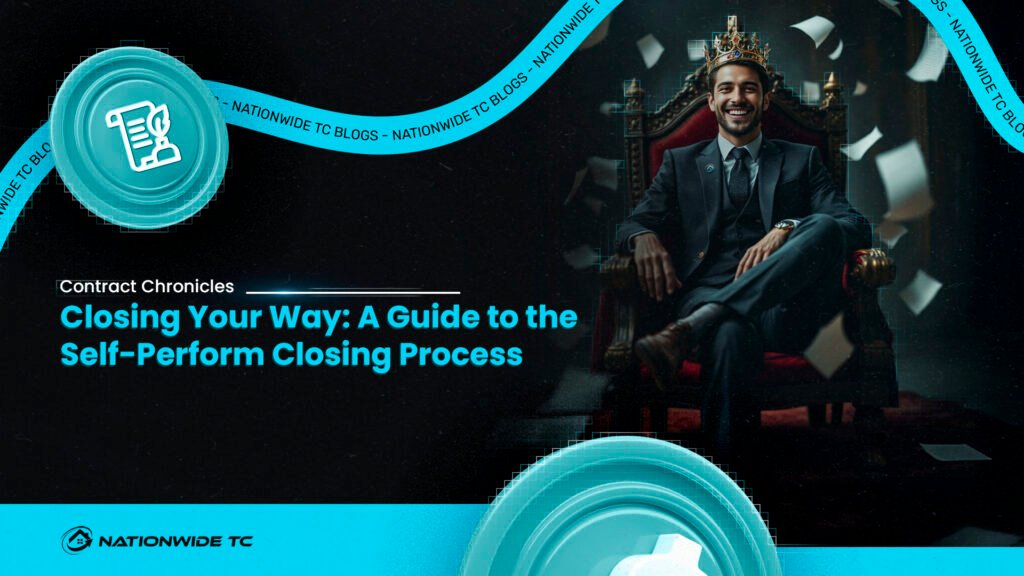Self Perform Closings give clients more control over the real estate transaction process. They allow buyers and sellers to manage the closing without relying entirely on third parties. This approach combines flexibility with responsibility, ensuring every detail aligns with your goals.
Through Self Perform Closings, individuals can directly handle documents, timelines, and communications. They can monitor every step without waiting for lengthy third-party responses. This method simplifies the transaction and helps clients feel empowered throughout the process.
However, to execute Self Perform Closings effectively, organization and precision are essential. That’s where transaction coordinators play an important role. They help guide each stage, ensuring compliance, accuracy, and a stress-free experience.
Why Self Perform Closings Are Gaining Popularity
In today’s fast-paced real estate market, efficiency matters. Many clients prefer taking an active role in their transactions. Self Perform Closings appeal to this mindset because they provide transparency and speed.
Buyers and sellers no longer want to feel detached from their deals. Instead, they value involvement and accountability. Through Self Perform Closings, they can control timing, review details, and avoid unnecessary costs.
Transaction coordinators make this process easier by managing the structure. They track deadlines, verify information, and ensure that all legal requirements are met. As the market evolves, Self Perform Closings continue to grow as a modern, client-driven approach.
The Role of a Transaction Coordinator in Self Perform Closings
Transaction coordinators act as the backbone of a successful Self Perform Closing. They handle communication between parties, track progress, and oversee document management. While clients maintain control, coordinators ensure no detail slips through the cracks.
During Self Perform Closings, coordinators confirm that every document is accurate and properly executed. They assist with scheduling, verify funding details, and monitor compliance with regulations. Their structured approach keeps clients confident and informed.
Moreover, transaction coordinators serve as educators. They explain each step, so clients understand what they’re signing and why it matters. Through their expertise, clients experience both independence and professional assurance.
Benefits of Choosing Self Perform Closings
There are several advantages to managing your own closing process. The most significant is cost savings. Self Perform Closings eliminate unnecessary administrative fees and reduce dependency on multiple service providers.
Clients also gain greater flexibility. They can adjust schedules and negotiate terms directly with other parties. This independence creates a sense of ownership and satisfaction.
Additionally, Self Perform Closings promote transparency. Clients see every document, decision, and deadline firsthand. With a transaction coordinator guiding them, they maintain both control and confidence.
Preparing for the Self Perform Closing Process
Preparation is the key to a smooth Self Perform Closing. Before starting, clients should gather all required documents, including contracts, disclosures, and loan agreements. Reviewing these in advance reduces stress later.
Next, clients should create a detailed checklist. This ensures every step—from inspection to final signatures—follows a clear timeline. Communication between parties must remain consistent to prevent confusion or delays.
Transaction coordinators help by organizing these materials and confirming accuracy. They keep digital and physical records secure while ensuring compliance with all legal standards. With proper preparation, Self Perform Closings become efficient and rewarding experiences.
How Self Perform Closings Differ from Traditional Closings
Traditional closings rely heavily on external title companies or legal representatives. In contrast, Self Perform Closings place decision-making power directly in the hands of the participants.
This doesn’t mean cutting out professionals entirely. Instead, it focuses on collaboration rather than delegation. Clients work with their coordinators and advisors but maintain direct oversight.
Transaction coordinators bridge the gap between independence and compliance. They ensure that every stage—from documentation to funding—remains legally sound. This balance of autonomy and guidance makes Self Perform Closings a smart alternative for proactive clients.
Legal and Financial Considerations in Self Perform Closings
Every real estate closing involves legal and financial complexities. Self Perform Closings require attention to these details to ensure full compliance. Clients must understand local regulations, title requirements, and escrow processes.
Fortunately, transaction coordinators can guide clients through these technical aspects. They review each document for accuracy, confirm signatures, and ensure that all funds transfer correctly.
Even though Self Perform Closings offer independence, professional advice remains essential. Coordinators, attorneys, and financial institutions each play a role in ensuring smooth, secure outcomes. This teamwork keeps transactions safe and transparent.
The Importance of Accuracy in Self Perform Closings
Accuracy defines the success of Self Perform Closings. Every number, date, and name must match across documents. A single mistake could delay the process or even void an agreement.
Transaction coordinators double-check every entry to prevent such errors. They also verify that deadlines and conditions meet the contract’s terms. With their support, clients avoid costly mistakes and maintain peace of mind.
Accuracy also builds trust. When clients see that every detail aligns perfectly, they gain confidence in the process. This precision strengthens both professional credibility and client satisfaction.
How Transaction Coordinators Streamline Self Perform Closings
Efficiency is the hallmark of a good transaction coordinator. They simplify complex tasks into manageable steps. During Self Perform Closings, this skill becomes invaluable.
Coordinators maintain a master timeline that tracks every milestone—from the initial offer to final disbursement. They organize communication between agents, lenders, and clients, ensuring everyone stays updated.
Additionally, coordinators use technology to automate reminders and document sharing. This organization prevents delays and keeps the transaction moving forward. Clients who self-perform benefit from professional coordination without losing control.
Common Challenges in Self Perform Closings
While Self Perform Closings offer freedom, they can also present challenges. Clients may feel overwhelmed by the volume of paperwork or legal terms. Missing a deadline could delay closing or risk penalties.
Transaction coordinators anticipate these challenges before they arise. They maintain order by tracking every requirement and following strict checklists. Their oversight ensures nothing falls through the cracks.
By combining client autonomy with expert support, Self Perform Closings overcome typical roadblocks. This blend of freedom and structure leads to smoother, more satisfying transactions.
Technology and the Future of Self Perform Closings
Technology plays a major role in making Self Perform Closings accessible. Digital platforms allow for online signatures, remote document management, and instant communication. These tools reduce time and increase convenience for everyone involved.
Transaction coordinators use these innovations to streamline workflows. They track every update and notify clients automatically. With secure cloud systems, all documents remain accessible and protected.
As the industry continues to digitize, Self Perform Closings will become even more efficient. Coordinators who embrace technology will lead this transformation and deliver unmatched client experiences.
Self Perform Closings and Client Empowerment
Self Perform Closings symbolize empowerment. They let clients take control of their property transactions while staying supported by experts. This sense of involvement increases satisfaction and reduces uncertainty.
Clients appreciate having full visibility over their progress. They can see every step, ask questions, and make informed decisions. Coordinators act as trusted partners who ensure clarity and compliance.
Together, they create a process that is both personal and professional. The result is a transaction where clients feel genuinely in charge of their success.
The Financial Impact of Self Perform Closings
Cost efficiency is one of the biggest attractions of Self Perform Closings. Clients can save significantly by managing certain aspects independently.
However, the real value lies in understanding where to invest and where to save. Transaction coordinators help clients allocate resources wisely, ensuring legal compliance without overspending.
They also help avoid penalties from missed steps or late submissions. Over time, the savings from a well-managed Self Perform Closing add up, proving that control can also be cost-effective.
Why Real Estate Professionals Should Embrace Self Perform Closings
Real estate professionals, including agents and coordinators, can benefit from supporting Self Perform Closings. By offering this flexible model, they attract clients who prefer independence.
Transaction coordinators especially gain opportunities to expand their service offerings. By helping clients self-perform effectively, they demonstrate expertise and adaptability.
Additionally, embracing this model shows that professionals value transparency and trust. It builds long-term relationships and enhances reputations in a competitive market.
Building Confidence Through Self Perform Closings
Confidence drives every successful transaction. When clients understand their closing process, they feel more secure and prepared. Self Perform Closings build that confidence through active involvement.
Transaction coordinators nurture this confidence by providing structure and guidance. They ensure clients understand every form and deadline. This reassurance transforms potentially stressful transactions into positive experiences.
Ultimately, Self Perform Closings empower both clients and coordinators to work together in harmony toward a shared goal—successful completion.
How to Start Your Own Self Perform Closing
Starting a Self Perform Closing begins with education. Clients should learn the process, required documents, and potential challenges. Then, they should consult a transaction coordinator for expert guidance.
The coordinator will outline the steps, from drafting agreements to confirming disbursements. They ensure the client remains informed and supported throughout.
With a well-organized plan, clients can complete their closing efficiently. Each successful transaction builds confidence and demonstrates that control doesn’t mean complexity—it means empowerment.
Final Thoughts: Closing Your Way with Confidence
Self Perform Closings redefine how people approach real estate transactions. They combine independence, savings, and transparency in a single streamlined process. With professional coordination, they become both simple and secure.
Transaction coordinators play a vital role in making this method effective. They blend expertise with structure, ensuring that clients stay confident from start to finish.
Ultimately, Self Perform Closings remind us that closing a deal doesn’t have to be stressful or confusing. With the right preparation and coordination, clients can truly close their way—with confidence, control, and clarity.
Click Here To Learn More About Our Self Perform Closing Services!
Book a Free 15 Minute Call Today and Find Out More About Our Services!



